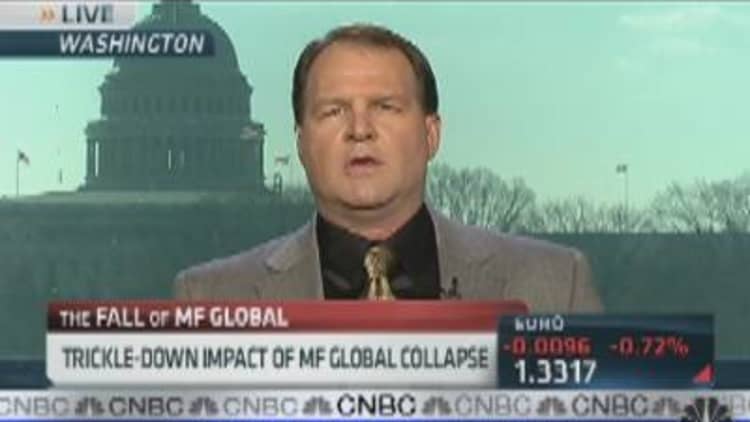MF Global's former chief Jon Corzine told Congress Thursday that he doesn't know where the failed brokerage firm's missing client money is and that he inherited a firm doomed by the risks his predecessors took.
"The firm reported losses in five consecutive quarters before I arrived," he told the House Agriculture Committee after being sworn in by committee Chairman Frank Lucas.
Yet Corzine accepted responsibility for the firm's risky bets and says its customers' losses weigh on his mind "every day, every hour."
"My hope, my expectation is that the money will be recovered," he said, deflecting questions as to whether he anticipates any loss to his own personal funds.
The former U.S. senator was subpoenaedto explain how MF Global, which he led for about 20 months, collapsed into the eighth-largest bankruptcy in U.S. history and why an estimated $1.2 billion in client funds remains unaccounted for.
"I simply do not know where the money is, or why the accounts have not been reconciled to date," he said, adding, "We've got to find the money."
Thursday's hearing marks Corzine's first public appearance since he resigned as CEO on Nov. 3.
Questioned directly about the transactions leading to over $1 billion in missing client funds, Corzine could not offer clarification.
"I never intended to break any rules. I'm not in a position given the number of transactions to know about the movement of any specific funds. I certainly would never intend to have segregated funds moved," said Corzine.
Corzine was clear, however, that he "does not believe" that customer funds have been invested in sovereign debt. Instead of offering a plausible alternative explanation, he said "transferring customer funds is a complex process."

He does not know whether there were "operational errors" at MF Global or whether other companies have held onto money that should be returned to MF Global.
"There were an extraordinary number of transactions during MF Global's last few days," he said, "and I do not know, for example, whether there were operational errors at MF Global or elsewhere, or whether banks and counterparties have held onto funds that should rightfully have been returned to MF Global."
In his testimony, Corzine distanced himself from some hands-on aspects of the firm's business practices.
"Even when I was at MF Global, my involvement in the firm's clearing, settlement and payment mechanisms and accounting was limited," Corzine said.
"I was stunned when I was told on Sunday, October 30, 2011, that MF Global could not account for many hundreds of millions of dollars of client money."
This prompted one House panel member say, "We have here inordinate risk taking, the improper co-mingling of segregated funds, and an another assault on the trust in the nation's financial institutions.
Corzine did not react to that characterization, but accepted responsibility for the repo-to-maturity trades that related to the firm's $6.3 billion bet on European sovereign debt.
"At the time that MF Global entered into the transactions, I believed that its investments in short-term European debt securities were prudent," he said.
MF Global's massive bets on European sovereign debtcaused markets to lose confidence in the firm, and led to its collapse.
However, he said MF Global reduced leverage during his tenure, and said he does "not claim to be an accountant" regarding the treatment of that exposure.
He was then asked by a lawmaker to describe his job as CEO. "I represent the firm externally with clients, counterparties, and regulators. Given the business strategy, I was required to hire new personnel. I hired a new internal audit, and a new chief risk officer," he said.
Corzine's testimony stands him in opposition to the regulators with whom he claimed to communicate. Many experts are raising concerns that the federal Sarbanes-Oxley Act of 2002, enacted to set stricter accounting standards for US, was not properly enforced.
Steve Luparello, vice chairman of the Financial Industry Regulatory Authority, said in his testimony on Thursday that MF Global was not fully candid with FINRA in 2010 when the firm was asked about its exposure to European debt.
Luparello said the firm indicated in late September 2010 that it "did not have any such positions" in European sovereign debt.
"We later learned that the firm began entering into transactions that carried European debt exposure in mid-September 2010," he said.
Industry experts are now raising the possibility that MF Global's sovereign debt positions may have been held in an external subsidiary, and thus were outside the purview of FINRA oversight. This, however, has not been confirmed.

